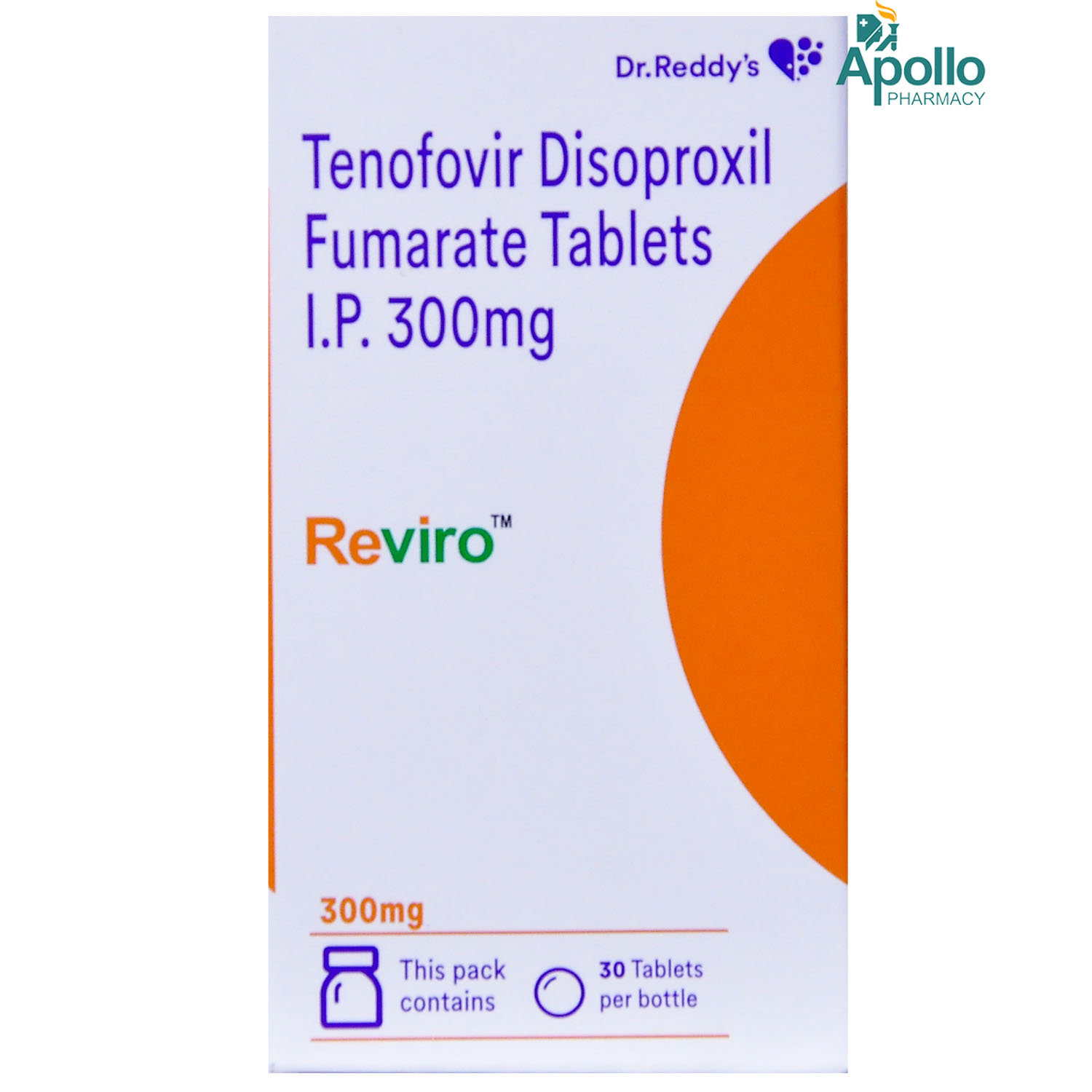Tenof 300 mg Tablet 10's




MRP ₹457.5
(Inclusive of all Taxes)
₹68.6 Cashback (15%)
Selected Pack Size:10
10 ₹411.75
(₹41.18 per unit)
Out of stock
30 ₹1298.7
(₹43.29 per unit)
In Stock
Provide Delivery Location
Online payment accepted
 Prescription drug
Prescription drugWhats That
Composition :
Manufacturer/Marketer :
Consume Type :
Expires on or after :
Return Policy :
About TENOF 300MG TABLET
TENOF 300MG TABLET belongs to the group of medications called ‘antiretroviral drugs’ used to treat HIV infection and chronic hepatitis B. Human immunodeficiency virus (HIV) is a sexually transmitted infection that, over time, leads to acquired immunodeficiency syndrome (AIDS). Chronic hepatitis B is a long-term viral infection caused by the hepatitis B virus.
TENOF 300MG TABLET contains ‘Tenofovir disoproxil’, a ‘nucleotide reverse transcriptase inhibitor’ that works by interfering with the normal working of enzymes (reverse transcriptase in HIV and DNA polymerase in HBV) that are essential for the production of viruses. It effectively reduces the symptoms associated with HIV and chronic hepatitis B infection.
You should use this medicine as prescribed by your doctor. The common side-effects of TENOF 300MG TABLET are diarrhoea, being sick (vomiting), feeling sick (nausea), bloating, flatulence, weakness, dizziness, headache, abdominal pain, and fatigue. However, seek medical attention if the side effects persist or worsen.
Do not take TENOF 300MG TABLET if you are allergic to any of its contents. Patients should take necessary precautions to avoid infecting others. It should be used cautiously in patients with severe liver and kidney diseases. Consult a doctor immediately if you develop any new signs of infection while using this medicine. Inform your doctor if you are pregnant, planning to become pregnant, or breastfeeding.
Uses of TENOF 300MG TABLET
Directions for Use
Key Benefits
TENOF 300MG TABLET contains ‘Tenofovir disoproxil’, which is an antiretroviral agent. It can effectively cause viral suppression in HIV and chronic hepatitis B. It acts on the enzymes that are essential for the replication of the virus. The enzyme essential for HIV replication is reverse transcriptase, and the enzyme for hepatitis B is DNA polymerase. TENOF 300MG TABLET blocks these enzymes and decreases the viral load in the blood.
Storage
- Rest well; get enough sleep.
- Eat a balanced diet and drink enough water.
- Manage stress with yoga and meditation.
- Limit alcohol and caffeine.
- Physical activities like walking or jogging might help boost energy and make you feel less tired.
- Inform Your Doctor: Notify your doctor immediately about your diarrhoea symptoms. This allows them to adjust your medication or provide guidance on managing side effects.
- Stay Hydrated: Drink plenty of fluids to replace lost water and electrolytes. Choose water, clear broth, and electrolyte-rich drinks. Avoid carbonated or caffeinated beverages to effectively rehydrate your body.
- Follow a Bland Diet: Eat easy-to-digest foods to help firm up your stool and settle your stomach. Try incorporating bananas, rice, applesauce, toast, plain crackers, and boiled vegetables into your diet.
- Avoid Trigger Foods: Steer clear of foods that can worsen diarrhoea, such as spicy, fatty, or greasy foods, high-fibre foods, and dairy products (especially if you're lactose intolerant).
- Practice Good Hygiene: Maintain good hygiene to prevent the spread of infection. To stay healthy, wash your hands frequently, clean and disinfect surfaces regularly, and avoid exchanging personal belongings with others.
- Take Anti-Diarrheal Medications: If your doctor advises, anti-diarrheal medications such as loperamide might help manage diarrhoea symptoms. Always follow your doctor's directions.
- Keep track of your diarrhoea symptoms. If they don't get better or worse or are accompanied by severe stomach pain, blood, or dehydration signs (like extreme thirst or dark urine), seek medical help.
- Inform your doctor about the nausea and discuss possible alternatives to the medication or adjustments to the dosage.
- Divide your daily food intake into smaller, more frequent meals to reduce nausea.
- Opt for bland, easily digestible foods like crackers, toast, plain rice, bananas, and applesauce.
- Avoid certain foods that can trigger nausea, such as fatty, greasy, spicy, and smelly foods.
- Drink plenty of fluids, such as water, clear broth, or electrolyte-rich beverages like coconut water or sports drinks.
- Use ginger (tea, ale, or candies) to help relieve nausea.
- Get adequate rest and also avoid strenuous activities that can worsen nausea.
- Talk to your doctor about taking anti-nausea medication if your nausea is severe.
- Record when your nausea occurs, what triggers it, and what provides relief to help you identify patterns and manage your symptoms more effectively.
- Apply a hot/cold pack to the affected area.
- Doing gentle exercises can help cope with pain by stretching muscles.
- Get enough sleep. It helps enhance mood and lower pain sensitivity.
- Avoid alcohol, smoking and tobacco as they can increase pain.
- Follow a well-balanced meal.
- Meditation and massages may also help with pain.
- Remember, managing depression as a side effect of medication requires patience, persistence, and collaboration with your healthcare team.
- Tell your doctor about your depression symptoms to adjust medication.
- Consult a therapist or counsel for emotional support.
- Engage in regular exercise to release endorphins (neurotransmitters).
- Practice stress-reducing techniques like meditation and deep breathing.
- Build a support network of friends, family, and support groups.
- Establish a consistent sleep schedule.
- Eat a nutritious diet rich in fruits, vegetables, and whole grains.
- Limit or avoid alcohol and recreational substances.
- Keep a mood journal to track symptoms and progress.
Drug Warnings
Do not take TENOF 300MG TABLET if you are allergic to ‘tenofovir disoproxil’ or any other contents present in it. It is contraindicated in adolescents with kidney failure. When this medicine is used in combination therapy for HIV, there is a risk of osteonecrosis (bone tissue death). There is a severe risk of fatal complications in patients with severe liver diseases, including chronic hepatitis B or C. Consult a doctor immediately if you develop any new signs of infection while using this medicine, as there is a chance of opportunistic infections (infection seen in patients with a weak immune system). Inform your doctor if you are pregnant, planning to become pregnant, or breastfeeding.
Drug-Drug Interactions
Drug-Drug Interactions
Login/Sign Up
Combining Tenof 300 mg Tablet and Streptozocin can increase the risk of kidney problems.
How to manage the interaction:
Taking Tenof 300 mg Tablet with Streptozocin is not recommended, as it can lead to an interaction, it can be taken if advised by your doctor. However, if you experience any symptoms like nausea, vomiting, loss of appetite, increased or decreased urination, sudden weight gain or weight loss, fluid retention, swelling, shortness of breath, bone pain, muscle cramps, tiredness, weakness, dizziness, confusion, and irregular heart rhythm. Do not stop using any medications without talking to your doctor.
Coadministration of Didanosine with Tenof 300 mg Tablet can increase the levels and risk of Didanosine side effects.
How to manage the interaction:
Taking Didanosine with Tenof 300 mg Tablet is not recommended, please consult your doctor before taking it. It can be taken if your doctor prescribes it. However, if you experience severe headaches, confusion, weakness, trouble walking, muscle pain, or high fever, contact your doctor immediately. Do not discontinue any medications without consulting a doctor.
Coadministration of Primidone and Tenof 300 mg Tablet can increase the risk of developing Tenof 300 mg Tablet side effects.
How to manage the interaction:
Taking Tenof 300 mg Tablet and Primidone together can possibly result in an interaction, it can be taken if prescribed by a doctor. However, if you experience any symptoms like dizziness, diarrhea, headache, or trouble sleeping, contact a doctor immediately. Do not discontinue any medications without consulting a doctor.
Coadministration of Phenobarbital and Tenof 300 mg Tablet can reduce the levels of Tenof 300 mg Tablet, which can lead to low treatment outcomes.
How to manage the interaction:
Taking Tenof 300 mg Tablet with Phenobarbital can result in an interaction, it can be taken when a doctor has advised it. Do not discontinue any medications without consulting a doctor.
Coadministration of Celecoxib with Tenof 300 mg Tablet may increase the risk of kidney problems.
How to manage the interaction:
Taking Celecoxib with Tenof 300 mg Tablet together can possibly result in an interaction, but it can be taken if your doctor has advised it. Consult the doctor immediately if you experience symptoms such as nausea, vomiting, loss of hunger, increased or decreased urination, sudden weight gain or weight loss, shortness of breath, muscle cramps, or dizziness. Do not discontinue any medications without consulting a doctor.
Coadministration of Tenof 300 mg Tablet with Methotrexate may increase the levels and side effects of Tenof 300 mg Tablet.
How to manage the interaction:
Although there is a possible interaction between Tenof 300 mg Tablet and methotrexate, you can take these medicines when prescribed by your doctor. However, if you experience any symptoms such as vomiting, loss of appetite, increased or decreased urination, sudden weight gain or weight loss, breathing difficulty, or dizziness, consult your doctor. Do not stop using any medications without consulting a doctor.
Coadministration of Tenof 300 mg Tablet with Amikacin can increase the risk of developing kidney problems.
How to manage the interaction:
Although taking Amikacin and Tenof 300 mg Tablet together can result in an interaction, it can be taken when a doctor has prescribed it. Consult the doctor if you experience vomiting, loss of appetite, irregular urination, sudden weight gain or loss, shortness of breath, weakness, or dizziness. Do not discontinue any medications without a doctor's advice.
Coadministration of Ketorolac with Tenof 300 mg Tablet may increase the risk of developing kidney problems.
How to manage the interaction:
Although taking Ketorolac and Tenof 300 mg Tablet together can possibly result in an interaction, it can be taken when your doctor has prescribed it. However, if you experience symptoms like nausea, vomiting, loss of appetite, increased or decreased urination, sudden weight gain or loss, shortness of breath, fatigue, dizziness, confusion, and irregular heartbeat, consult a doctor. Do not discontinue any medications without consulting a doctor.
Coadministration of Phenytoin and Tenof 300 mg Tablet can reduce the levels of Tenof 300 mg Tablet, which can lead to low treatment outcomes.
How to manage the interaction:
Taking Tenof 300 mg Tablet and Phenytoin together can result in an interaction, but it can be taken if your doctor has advised it. Do not discontinue any medications without consulting a doctor.
Coadministration of Olsalazine and Tenof 300 mg Tablet can increase the risk of developing kidney problems.
How to manage the interaction:
Taking Olsalazine and Tenof 300 mg Tablet together can lead to an interaction, but it can be taken if your doctor advises. However, if you experience any symptoms like vomiting, increased or decreased urination, sudden weight gain or weight loss, shortness of breath, muscle cramps, dizziness, and irregular heart rhythm, contact your doctor immediately. Do not discontinue any medications without first consulting your doctor.
Drug-Food Interactions
Drug-Food Interactions
Login/Sign Up
Diet & Lifestyle Advise
- Eat a diet with fresh fruits and vegetables.
- Option for lean meat such as skinless chicken and fish. Limit processed and high-sugar foods.
- Avoid acidic foods such as tomatoes, lemons, and oranges.
- Limit alcohol intake and quit smoking.
- Exercise regularly as it promotes both physical and mental health.
- Take the necessary precautions to avoid the spread of infection to other people.
Side Effects of TENOF 300MG TABLET
- Diarrhoea
- Vomiting
- Nausea
- Bloating
- Flatulence
- Weakness
- Dizziness
- Headache
- Abdominal pain
- Fatigue
Habit Forming
Therapeutic Class
All Substitutes & Brand Comparisons
RX
Out of StockTENTIDE 300MG TABLET
₹35.35
(₹31.81 per unit)
22% CHEAPERRX
Teravir Tablet 30's
Natco Pharma Ltd
₹1310
(₹39.3 per unit)
4% CHEAPERRX
Out of StockVIREAD TABLET 30'S
Piramal Enterprises Ltd
₹1379
(₹40.45 per unit)
1% CHEAPER
Product Substitutes
Drug-Diseases Interactions
Drug-Diseases Interactions
Login/Sign Up
FAQs
TENOF 300MG TABLET works by blocking the action of enzymes that are essential for viral replication.
TENOF 300MG TABLET does not affect fertility. However, consult your doctor immediately if you develop any side effects while using TENOF 300MG TABLET.
TENOF 300MG TABLET should be taken as prescribed by your doctor. Abrupt stopping of this medicine may lead to resistance to other medications making the infection difficult to treat.
Drug-Drug Interactions Checker List
- PENTAMIDINE
- VANCOMYCIN
- AMPHOTERICIN B
- FOSCARNET
- GANCICLOVIR
- CIDOFOVIR
- INTERLEUKIN-2
- TACROLIMUS
- DIDANOSINE
- ADEFOVIR DIPIVOXIL
Special Advise
Your doctor may regularly monitor liver function, kidney function, and bone density if you take TENOF 300MG TABLET.
Disease/Condition Glossary
Human immunodeficiency syndrome (HIV): It is a virus that suppresses the immune system and causes acquired immunodeficiency syndrome (AIDS) over time. The suppression of immunity leads to the development of opportunistic infections. It is a life-long condition, and there is no permanent cure. The treatment (antiretroviral therapy) is given to suppress the infection.
Chronic Hepatitis B: It is a severe and long-term liver infection caused by the hepatitis B virus (HBV). It spreads by contact with infected body fluids. The symptoms of this condition are abdominal pain, dark urine, and yellowing of the eyes.

Have a query?
Buy best Infections & Infestation products by
Cipla Ltd
Macleods Pharmaceuticals Ltd
Alkem Laboratories Ltd
Lupin Ltd
Abbott India Ltd
Sun Pharmaceutical Industries Ltd
Mankind Pharma Pvt Ltd
Micro Labs Ltd
Aristo Pharmaceuticals Pvt Ltd
FDC Ltd
Intas Pharmaceuticals Ltd
Glenmark Pharmaceuticals Ltd
Ipca Laboratories Ltd
Torrent Pharmaceuticals Ltd
Zydus Healthcare Ltd
Biochem Pharmaceutical Industries Ltd
Zuventus Healthcare Ltd
United Biotech Pvt Ltd
Hetero Drugs Ltd
Emcure Pharmaceuticals Ltd
Alembic Pharmaceuticals Ltd
Indoco Remedies Ltd
Fusion Health Care Pvt Ltd
Dr Reddy's Laboratories Ltd
Leeford Healthcare Ltd
Cadila Healthcare Ltd
Wockhardt Ltd
Zydus Cadila
GlaxoSmithKline Pharmaceuticals Ltd
Morepen Laboratories Ltd
Blue Cross Laboratories Pvt Ltd
Cadila Pharmaceuticals Ltd
Converge Biotech Pvt Ltd
Elder Pharmaceuticals Ltd
Hetero Healthcare Pvt Ltd
Pfizer Ltd
AAA Pharma Trade Pvt Ltd
Gufic Bioscience Ltd
Mylan Pharmaceuticals Pvt Ltd
Corona Remedies Pvt Ltd
Wallace Pharmaceuticals Pvt Ltd
Apex Laboratories Pvt Ltd
Medishri Healthcare Pvt Ltd
Akumentis Healthcare Ltd
Alniche Life Sciences Pvt Ltd
Hegde & Hegde Pharmaceutica Llp
Veritaz Healthcare Ltd
Ranbaxy Laboratories Ltd
Koye Pharmaceuticals Pvt Ltd
Shreya Life Sciences Pvt Ltd
Overseas Health Care Pvt Ltd
Biocon Ltd
Indchemie Health Specialities Pvt Ltd
Medley Pharmaceuticals Ltd
Brinton Pharmaceuticals Ltd
J B Chemicals & Pharmaceuticals Ltd
Unifaith Biotech Pvt Ltd
Ajanta Pharma Ltd
Biochemix Health Care Pvt Ltd
Natco Pharma Ltd
Samarth Life Sciences Pvt Ltd
Unichem International
Laborate Pharmaceuticals India Ltd
Unipark Biotech Pvt Ltd
Zymes Bioscience Pvt Ltd
Indiabulls Pharmaceuticals Pvt Ltd
Neon Laboratories Ltd
Vasu Organics Pvt Ltd
DR Johns Lab Pharma Pvt Ltd
East West Pharma India Pvt Ltd
La Renon Healthcare Pvt Ltd
Medgen Drugs And Laboratories Pvt Ltd
Novartis India Ltd
Canixa Life Sciences Pvt Ltd
Icarus Health Care Pvt Ltd
Lincoln Pharmaceuticals Ltd
Celon Laboratories Pvt Ltd
Concept Pharmaceuticals Ltd
Klm Laboratories Pvt Ltd
Nicholas Piramal India Ltd
Systopic Laboratories Pvt Ltd
Yuventis Pharmaceuticals
Capital Pharma
German Remedies Ltd
Pristine Pearl Pharma Pvt Ltd
Unison Pharmaceuticals Pvt Ltd
Aurz Pharmaceutical Pvt Ltd
Clover Health Care Pharma
Kepler Healthcare Pvt Ltd
Allites Life Sciences Pvt Ltd
Auspharma Pvt Ltd
Intra Life Pvt Ltd
Jolly Healthcare
Linux Laboratories Pvt Ltd
Ozone Pharmaceuticals Ltd
Cachet Pharmaceuticals Pvt Ltd
Comed Chemicals Ltd
Delcure Life Sciences Ltd
Fresenius Kabi India Pvt Ltd
Khandelwal Laboratories Pvt Ltd
Alcohol
Safe if prescribed
Consuming alcohol while using TENOF 300MG TABLET may worsen the condition.
Pregnancy
Consult your doctor
TENOF 300MG TABLET is a category B medicine. It should be used with caution in pregnant women.
Breast Feeding
Consult your doctor
In the case of chronic hepatitis B, TENOF 300MG TABLET should be used in breastfeeding mothers only if clinically needed. Avoid breastfeeding if you have HIV.
Driving
Safe if prescribed
TENOF 300MG TABLET may cause dizziness. So, avoid driving if you feel dizzy.
Liver
Consult your doctor
TENOF 300MG TABLET should be used with caution if you have liver disease. Dose adjustments may be necessary.
Kidney
Consult your doctor
TENOF 300MG TABLET should not be used in adolescents with kidney failure. In other people with severe kidney diseases, TENOF 300MG TABLET is prescribed only if clinically needed.
Children
Safe if prescribed
TENOF 300MG TABLET should be used with caution in children below 12 years of age.







